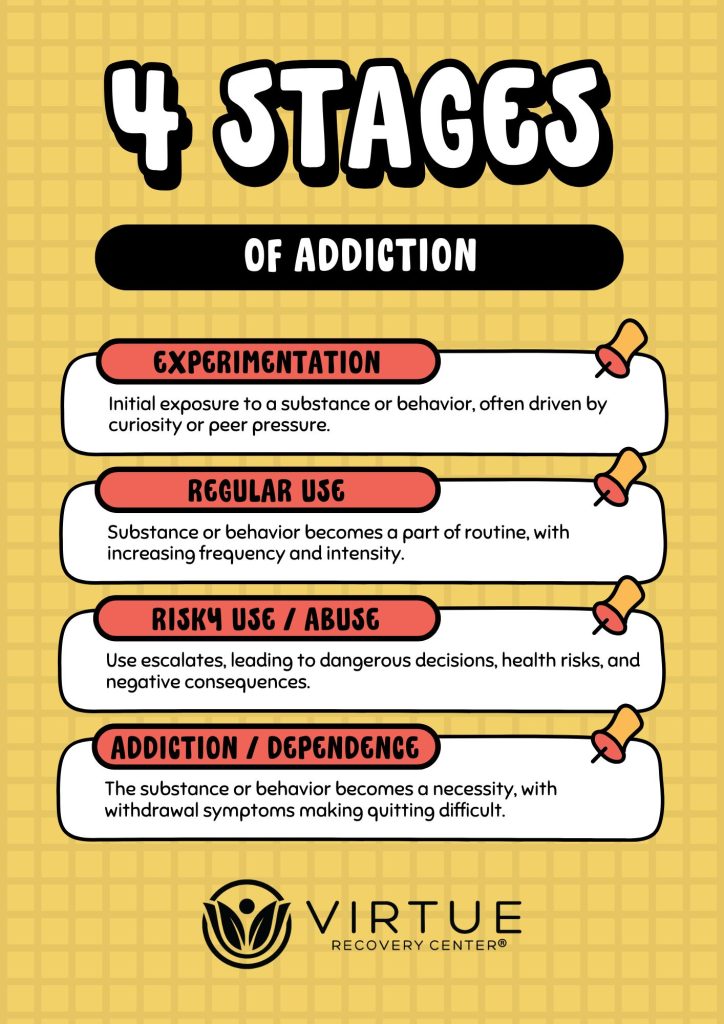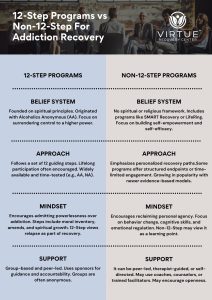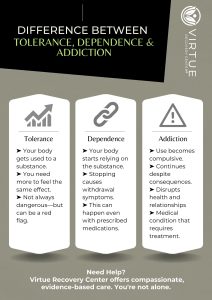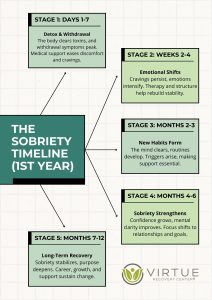Key Takeaways
- Addiction is a progressive disease that develops through four stages.
- The four stages of addiction are experimentation, regular use, risky use, and addiction/dependence.
- Recognizing addiction early can help prevent long-term consequences.
- Addiction is a chronic disease, not a choice, and it changes brain chemistry over time.
- Professional addiction treatment provides the best path to recovery and long-term sobriety.
Introduction
Addiction doesn’t happen overnight. It develops gradually, moving through distinct stages of substance use before a person becomes fully dependent. Many people begin using drugs or alcohol for fun, stress relief, or peer pressure. But over time, occasional use can turn into a serious problem.
Understanding the four stages of addiction can help individuals recognize when substance use is becoming dangerous. It can also encourage those at risk to seek treatment before addiction takes full control. Addiction is a chronic disease, but with the right support, recovery is possible.
This article will break down the addiction cycle, explain the warning signs at each stage, and discuss how professional addiction treatment can help individuals reclaim their lives.
The 4 Stages of Addiction
1. Experimentation: The First Stage of Addiction
The first stage of addiction begins with experimentation. A person may try a drug or alcohol for the first time out of curiosity, peer pressure, or stress relief.
At this stage, use is often casual and occasional. A person might drink at parties, take prescription painkillers for an injury, or try recreational drugs in a social setting. While experimentation does not always lead to addiction, it increases the risk—especially for those with a family history of substance abuse or underlying mental health conditions.
Because the person does not experience serious negative consequences yet, they may believe their use is harmless. However, repeated use can cause changes in the brain, making it more difficult to stop later.
2. Regular Use: Developing a Habit
At this stage, substance use becomes more frequent. A person may start drinking every weekend, using painkillers for reasons other than pain, or taking drugs more often to relax or cope with stress.
Regular use does not mean someone is addicted, but the habit is forming. Signs of regular use include:
- Using drugs or alcohol on a consistent basis.
- Drinking or using substances alone, not just in social settings.
- Thinking about the next opportunity to use.
- Needing larger amounts to feel the same effects.
While a person may still feel in control, their body and brain are starting to adjust to the substance. This increases the risk of dependence and moving into the next stage.
3. Risky Use: Ignoring Consequences
At this stage, substance use starts causing problems, but the person continues to use despite the consequences. They may need higher doses to feel the same effects, which increases the risk of overdose.
Signs of risky use include:
- Using drugs or alcohol in dangerous situations, such as before driving.
- Missing work, school, or important responsibilities due to substance use.
- Experiencing conflicts with family, friends, or coworkers.
- Needing the substance to feel normal or function socially.
At this point, the person may recognize that their substance use is becoming a problem but feel unable to stop. This is a warning sign that dependence is developing.
4. Addiction & Dependence: The Final Stage of the Addiction Cycle
The final stage is full addiction and dependence. The body and brain rely on the substance, making it nearly impossible to quit without professional help.
Physical Dependence
The body adapts to drugs or alcohol, causing withdrawal symptoms when a person stops using. These symptoms can include:
- Nausea, vomiting, and sweating.
- Shaking, anxiety, and depression.
- Severe cravings and physical discomfort.
Psychological Dependence
At this point, a person believes they cannot function without the substance. They may lose control over how much they use and continue using despite severe negative consequences.
Signs of addiction include:
- Health problems due to substance use.
- Legal or financial issues.
- Failed attempts to quit or control use.
- Broken relationships due to drug or alcohol use.
Addiction is a chronic disease, meaning it requires professional treatment. Without help, the person may continue using despite wanting to stop. At this stage, many people also experience relapse if they try to quit without support.
Infographic: The 4 Stages of Addiction

How to Break the Addiction Cycle
The good news is that addiction is treatable. Many people who struggle with substance use disorder can recover with the right addiction treatment and support.
Addiction Treatment Options
- Medical Detox – Safely removes drugs or alcohol from the body.
- Inpatient Rehab – Provides 24/7 care and therapy in a structured environment.
- Outpatient Programs – Allows individuals to receive treatment while continuing daily responsibilities.
- Behavioral Therapy – Helps individuals change thought patterns and behaviors related to addiction.
- Support Groups – Provides ongoing encouragement and accountability during recovery.
The earlier someone seeks help, the better their chances of recovery. If you or a loved one is struggling with addiction, don’t wait to get treatment.
Conclusion: Take the First Step Toward Recovery
Addiction develops in stages, and recognizing the warning signs can prevent long-term damage. Whether someone is in the early stages of experimentation or deep into addiction, help is available.
If you or someone you know is struggling with addiction, you don’t have to face it alone. Virtue Recovery Las Vegas offers comprehensive treatment to help individuals break free from addiction and start a new life. Call 866-520-2861 today to speak with a compassionate professional and begin the recovery journey.
FAQs
What are the 4 stages of addiction?
The four stages of addiction are experimentation, regular use, risky use, and addiction/dependence. Each stage progresses in severity, making quitting more difficult.
How does addiction affect the brain?
Addiction changes brain chemistry, leading to cravings, compulsive use, and difficulty stopping. It affects decision-making, impulse control, and emotional regulation.
Can someone stop addiction before it gets worse?
Yes! The earlier a person seeks help, the easier it is to recover. Recognizing the warning signs and getting treatment can prevent addiction from progressing.
What is the best treatment for addiction?
The best treatment depends on the individual. Detox, inpatient or outpatient rehab, therapy, and long-term recovery support are all effective options.
Where can I get help for addiction?
Virtue Recovery Las Vegas provides professional addiction treatment and support. Call 866-520-2861 for confidential help today.
What are the initial stages of drug addiction?
The initial stages of drug addiction typically begin with the person’s first use of the substance. This can lead to a gradual development of an addiction, where the individual may start experiencing loss of control over their drug use.
What are the common signs of addiction?
Common signs of addiction include changes in behavior, neglecting responsibilities, an increase in tolerance, withdrawal symptoms, and continued use despite negative consequences. Recognizing these signs can indicate the need for help.
How does the cycle of addiction work?
The cycle of addiction involves several stages, including initial use, development of addiction, and potential relapse. This cycle can repeat, making it crucial for individuals to seek treatment for substance abuse to break free from it.
What are the short-term effects of addiction?
The short-term effects of addiction can vary based on the substance used but often include impaired judgment, mood swings, and physical health issues. These effects can escalate quickly, impacting one’s daily life.
What are the long-term addiction effects?
Long-term addiction effects can include chronic disease, physical dependence, and significant mental health challenges. These effects can persist even after stopping the substance, highlighting the importance of comprehensive treatment options.
How can one overcome addiction?
Overcoming addiction often requires a combination of behavioral health support, therapy, and sometimes medication. Many individuals find success through rehabilitation programs or recovery centers that offer structured treatment for substance abuse.
What is the significance of relapse in the addiction cycle?
Relapse is a common occurrence in the recovery process and often indicates that the individual is still struggling with their substance use disorder. Understanding relapse rates for addiction can help in developing a more effective treatment plan.
What types of treatment are available for substance abuse?
Treatment for substance abuse can include inpatient and outpatient treatment programs, counseling, medication-assisted treatment, and support groups. Each recovery center may offer different approaches to meet the needs of individuals.
How does addiction impact mental health?
Addiction can significantly affect mental health, often leading to co-occurring disorders. Substance abuse and mental health issues are closely linked, and addressing both through integrated treatment is essential for successful recovery.
What steps should someone take if they suspect a loved one is struggling with addiction?
If you suspect a loved one is struggling with addiction, it is important to approach the situation with empathy and concern. Encourage them to seek help, offer to assist in finding a treatment center, and be supportive throughout their recovery journey.
Resources
https://www.ncbi.nlm.nih.gov/books/NBK424849/
https://www.medicalnewstoday.com/articles/stages-of-addiction
https://www.dentalcare.com/en-us/ce-courses/ce545/stages-of-substance-abuse












